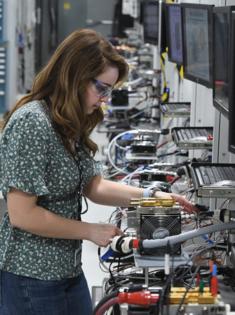GM ends work on hydrogen fuel cells for everyday driving, scraps planned Detroit plant
Published in Business News
General Motors Co. is scrapping plans for a factory in Detroit as part of a broader decision to end development of hydrogen fuel cells for everyday drivers, the automaker said Friday.
Salaried workers, primarily in Pontiac, were laid off Friday morning as part of the closure of GM's Hydrotec brand, spokesperson Stu Fowle said. Fowle declined to specify how many workers were let go in connection with Hydrotec's closure.
GM was set to employ 144 workers at planned factory for next-generation hydrogen fuel-cell batteries at the former site of the Michigan State Fair on Eight Mile in Detroit. The $55 million project was in partnership with a subsidiary of Piston Automotive, a supplier owned by former Detroit Pistons basketball player Vinnie Johnson.
That project is now dead, Fowle said.
"Every company has to look at and prioritize where we apply our resources," Fowle said. "And in this moment in time, we really want to put all of our effort toward our EV future."
Fowle said GM will meet with suppliers that partnered with the company on hydrogen fuel cells to phase out existing projects and look for other possible work for those companies.
The shift shows GM's faith in the future of EVs and its skepticism about the viability of using hydrogen fuel cells to power noncommercial vehicles.
The announcement from GM comes days after the Trump administration floated the cancellation of two federal grants worth a combined $52 million for the company to develop a fuel-cell manufacturing system and hydrogen fuel-cell trucks in Pontiac. The federal government already disbursed $9 million to the projects.
Both awards came under the Biden administration after the passage of Democrats' climate-focused Inflation Reduction Act.
Hydrogen fuel cells, which convert hydrogen into electricity, offer long range and quick recharging. But there were only 54 public hydrogen fuel stations in the United States as of 2024, and almost all are in California, according to the U.S. Department of Energy's Alternative Fuels Data Center.
GM will continue making hydrogen fuel cells at a Brownstown Township plant for use in commercial mining and heavy trucking through its Honda joint-venture Fuel Cell System Manufacturing LLC.
GM, mostly since the late 1990s, had invested nearly $3 billion in fuel-cell technology as of 2016. Fowle declined to provide more recent numbers. The company began work on the technology in the 1960s with two concept vehicles powered by hydrogen fuel cells.
(The Detroit News Washington Correspondent Grant Schwab contributed.)
©2025 www.detroitnews.com. Visit at detroitnews.com. Distributed by Tribune Content Agency, LLC.












Comments